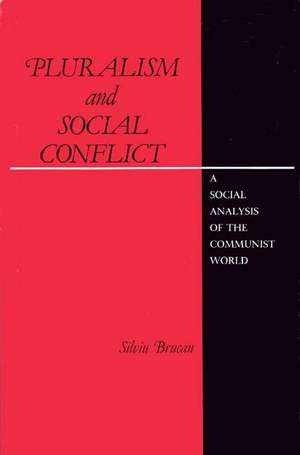Pluralism and Social Conflict: A Social Analysis of the Communist World
Autor Silviu Brucanen Limba Engleză Hardback – 27 aug 1990 – vârsta până la 17 ani
Preț: 436.04 lei
Preț vechi: 706.77 lei
-38% Nou
Puncte Express: 654
Preț estimativ în valută:
83.45€ • 85.46$ • 69.41£
83.45€ • 85.46$ • 69.41£
Carte tipărită la comandă
Livrare economică 18 martie-01 aprilie
Preluare comenzi: 021 569.72.76
Specificații
ISBN-13: 9780275934750
ISBN-10: 0275934756
Pagini: 216
Dimensiuni: 140 x 210 x 21 mm
Greutate: 0.43 kg
Ediția:New.
Editura: Bloomsbury Publishing
Colecția Praeger
Locul publicării:New York, United States
ISBN-10: 0275934756
Pagini: 216
Dimensiuni: 140 x 210 x 21 mm
Greutate: 0.43 kg
Ediția:New.
Editura: Bloomsbury Publishing
Colecția Praeger
Locul publicării:New York, United States
Notă biografică
SILVIU BRUCAN is Professor of Social Science at the University of Bucharest. He is the former Romanian Ambassador to the U.S. (1956-1959) and Ambassador to the UN (1959-1962). His previous works include The Post-Brezhnev Era (Praeger, 1983) and World Socialism at the Crossroads (Praeger, 1987).
Cuprins
Foreword by Immanuel WallersteinIntroductionEvolution of Classes and Class PolicySocial Structure and Scientific-Technological RevolutionSocial Conflict Generated by ReformSummary and ConclusionsSelected BibliographyIndex







